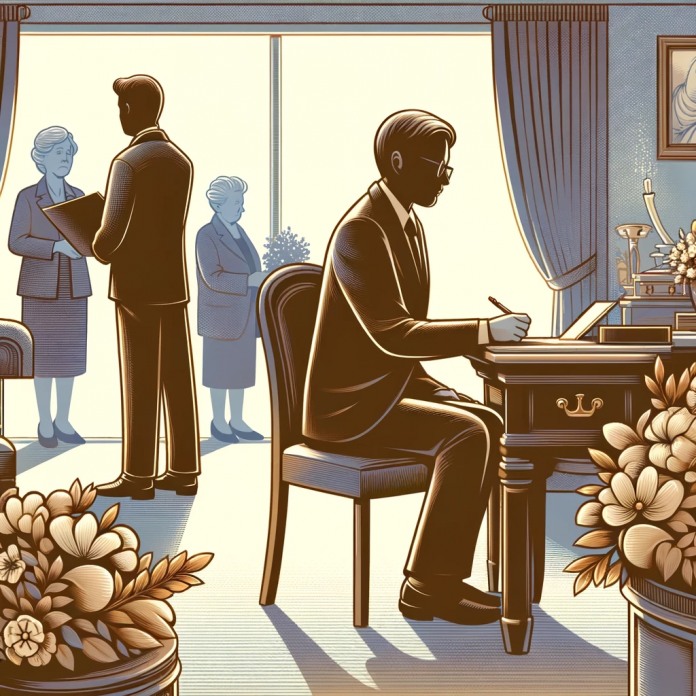Funeral directors play an essential role in the process of saying goodbye to a loved one. They are the unseen heroes who ensure that the final farewell is conducted with dignity, respect, and professionalism. This article delves into the behind-the-scenes roles of funeral directors, shedding light on their responsibilities and the importance of their work.
The Duties of a Funeral Director
Funeral directors wear many hats. They are event planners, grief counselors, and administrators rolled into one. They are responsible for planning and coordinating all aspects of a funeral service, from the initial consultation with the family to the final disposition of the body.
One of the primary roles of a funeral director is to provide emotional support to the grieving family. They are trained to handle grief and offer comfort during this difficult time. They also provide information and guidance on the various aspects of the funeral process, helping the family make informed decisions.
Planning and Coordinating the Funeral Service
Funeral directors are responsible for planning and coordinating the funeral service. This includes scheduling the date and time of the service, arranging for the transportation of the body, and coordinating with the cemetery or crematorium. They also handle the logistics of the service, such as setting up the venue, arranging for flowers, and coordinating with the clergy or celebrant.
Furthermore, funeral directors are responsible for preparing the body for viewing or burial. This can involve embalming, dressing, and applying makeup to the body, as well as placing it in the casket or urn. They also oversee the viewing or visitation, ensuring that it is conducted in a respectful and dignified manner.
Handling Legal and Administrative Tasks
Funeral directors also handle a variety of legal and administrative tasks. They are responsible for filing the death certificate and other necessary paperwork with the appropriate government agencies. They also assist the family in notifying friends and relatives, placing obituaries in newspapers, and arranging for military honors if applicable.
In addition, funeral directors often help the family with financial matters related to the funeral. This can include providing information on the costs of various services, helping the family understand their insurance benefits, and even setting up payment plans if necessary.
The Importance of Funeral Directors
Funeral directors play a crucial role in helping families navigate the difficult process of saying goodbye to a loved one. Their expertise and compassion can make a significant difference during this challenging time.
By taking care of the logistical aspects of the funeral, funeral directors allow the family to focus on their grief and remembering their loved one. They ensure that the funeral service is conducted according to the family's wishes and that the deceased is treated with the utmost respect and dignity.
Providing Emotional Support
Funeral directors are often the first point of contact for a grieving family. They provide a listening ear and a comforting presence, offering guidance and support throughout the funeral process. They understand the stages of grief and can provide resources and referrals for additional support if needed.
The emotional support provided by funeral directors can be invaluable to a grieving family. It can help them cope with their loss and begin the healing process.
Ensuring a Dignified Farewell
Funeral directors ensure that the deceased is treated with dignity and respect. They oversee the preparation of the body and the conduct of the funeral service, ensuring that everything is done according to the family's wishes and cultural or religious traditions.
By ensuring a dignified farewell, funeral directors help the family find closure and begin the process of healing. They provide a space for the family to say their final goodbyes and remember their loved one in a meaningful way.
Conclusion
The role of funeral directors is multifaceted and crucial. They provide much-needed support and guidance to grieving families, ensuring that the funeral process is conducted smoothly and respectfully. Their behind-the-scenes work is essential in helping families navigate the difficult journey of saying goodbye to a loved one.
Whether they are planning the funeral service, handling administrative tasks, or providing emotional support, funeral directors are an integral part of the funeral process. Their work is a testament to their dedication and commitment to serving families during their time of need.
Recommended Products
- Funeral Guest Book & Memory Card Set — Elegant guest book with matching memory cards for funeral and memorial services.
- COLIBROX Cremation Funnel Kit — Stainless steel funnel kit designed for carefully transferring ashes into urn jewelry and keepsakes.
- Mini Heart Urn — A small keepsake urn shaped like a heart for a portion of ashes


-banner.png)





